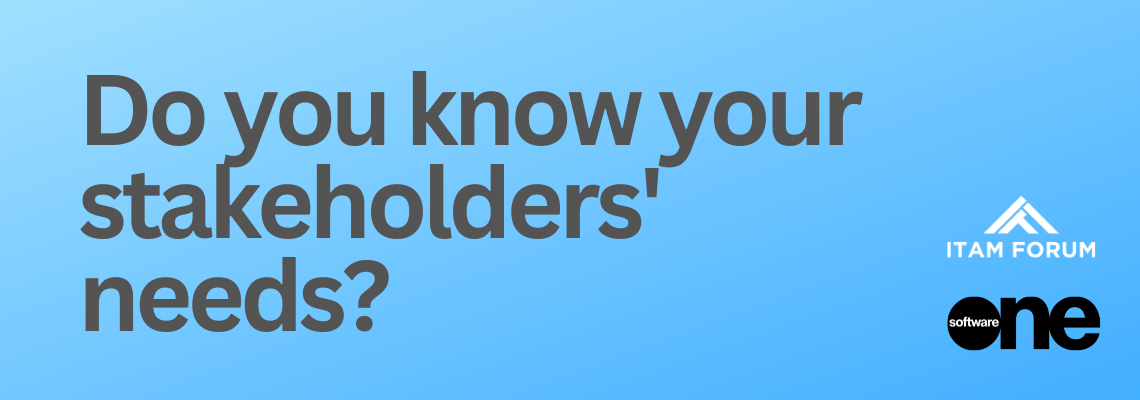This guest blog is from Shadi Khoshab – Global Director, ITAM and Software Sourcing Services – SoftwareOne.
Who are my stakeholders?
As the ITAM professional within your organization, your success and impact depends on your relationship with different stakeholders. The most important groups you should be working with span from C-level functions (CIO, CFO, CPO, CSO) to procurement/sourcing teams, legal (internal or external), business owners, and technical staff (database administrators, infrastructure/virtualization managers, public cloud managers, application owners).
What do they want to know?
Every stakeholder group has different interests. Generally, it comes down to identifying financial, operational, and/or legal risks and opportunities.
- One of the most important stakeholders and executive sponsor is the CIO. This person needs to understand any risks or opportunities that impact IT strategy or budgets, threaten business continuity and user experience, and, implications of technical or commercial change (for example, digital transformation initiatives or mergers and acquisitions).
- CFOs want to understand any factors that may have an impact on the financial position of the company.
- Procurement specialists want information that helps reduce costs and wastage.
- The legal team wants to understand what contractual/legal risks might be included in new contractual agreements.
- Line of business owners need to know the current and future strategy for specific software programs deployed (when is a specific version running out support, what could be migrated to the cloud, what could be refactored or re-architected, what could be retired, etc.).
- Technical staff (database administrators, infrastructure/virtualization managers, public cloud managers, application owners) want to know what software they can deploy and the implications of specific implementations/designs.
These are just some examples. These can change depending on projects, business strategy or even the time of year.
What they don’t want to know
All stakeholders are limited in time. They only want to hear about the specific information relevant to their roles. A database administrator doesn’t need to understand the details of the licensing terms and conditions agreed by procurement. But, they do need to understand which specific functionalities of a database they’re entitled to install and use and which ones they’re not.
You must adjust the information to the needs and role of the stakeholder.
Why should I work with them (what’s in it for me)?
ITAM professionals need to build good working relationships with many stakeholder types across the organization.
This will enable them to:
- gain access to the asset data and insights these stakeholders hold
- share important finance and risk-related intelligence
- promote ITAM best practice
- facilitate meaningful collaboration
ITAM teams should source data from both tooling and stakeholders across the business. It’s unrealistic for one source to provide the complete, accurate and trustworthy data required to equip C-level decision makers with the actionable intelligence they need to accurately define future strategy and make effective decisions.
Why should they work with me (what’s in it for them)?
ITAM professionals must realize that stakeholders have different needs. So, collaboration and the exchange of data and information is mutually beneficial. It’s therefore very important to be clear on the ITAM program and operations’ purpose when requesting information or data from stakeholders. Open and clear communication is key.
For example:
- A database administrator will find it useful to get an overview of the different database platforms deployed within the infrastructure. This will help with planning upgrades to higher database versions.
- Procurement teams needing to negotiate new software contracts with publishers may not have full visibility of current contractual terms and conditions. They may also not know details about usage and deployment limitations. By working with you, they will come to understand what to keep in a contract and what to negotiate.
If you don’t know the needs of your key stakeholder groups, ask them! Ask them how you can make their job easier. Discuss how you can support them.
At the end of the day, you have the common goal of moving the business forward.
ITAM Forum members: Learn more about working with stakeholders. Access our on-demand ITAM Power Skills webinar.

